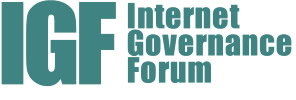Between Digital Rights and Internet Control: The 9th Internet Governance Forum
Posted by: Dr Arne Hintz
 Internet governance has emerged from the geeky tech world to become a major social and political area of contention.
Internet governance has emerged from the geeky tech world to become a major social and political area of contention.
Online surveillance, as highlighted by the Snowden revelations, and increasing filtering and blocking of internet content affect our regular online communication, and the decision-making structures for internet resources are changing rapidly (as the US government is about to cede control over the Internet Corporation for Assigned Names and Numbers ICANN). In this context of public debate and power struggles, the Internet Governance Forum (IGF) was held for the 9th time, 2-5 September in Istanbul.
Created as an outcome of the UN World Summit on the Information Society (WSIS) in 2003 and 2005, and held annually since then, the IGF has brought governments, the business sector and civil society groups together for open exchanges and consensus-building over internet policy and related issues such as infrastructure development, cybersecurity and human rights. As a forum for debate (but without actual decision-making power), it has served a key function in the broader ‘ecology’ of internet governance, complementing ICANN’s focus on infrastructure decisions and more specific conferences such as Netmundial. The IGF is an open forum, anyone can register without a fee or other accreditation requirements (although, of course, not everyone can afford travelling to the conferences which take place in a different part of the world each year).
The ongoing fragmentation of the internet was one of many issues discussed at this year’s IGF. With the proliferation of filtering and blocking (due to political censorship, copyright protection, etc.) and attempts to localise and nationalise data processing, national borders are making a comeback and the internet in one country now looks very different from that in another country. Another emerging theme has been the increasing practice by intermediaries, such as social media platforms and search engines, to restrict online content, for example because they may be liable for user-generated content or because of requests from the copyright industry (Google takes down several million search results each month due to alleged copyright infringement). At the same time, intermediaries may have reasonable responsibilities in, for example, intervening in hate speech on their platforms.
Other issues discussed at the IGF range from broadband development in the Global South to child protection and, this year, included a broader debate on the current controversies over network neutrality. Beyond open debate, the IGF also promotes so-called ‘Dynamic Coalitions’ in which members of diverse organisations develop common statements and policy suggestions.
The Snowden revelations, which have made huge waves over the past year, were less prominent in most IGF discussions than one might expect. Similarly, the debate on content censorship was rather mute, particularly so with regards to the practices of the host country Turkey where thousands of websites are blocked.
To both criticise and fill these blindspots, Turkish activists and academics organised an ‘Ungovernance Forum’ in parallel to the IGF. Here, the implications of censorship and surveillance were at the top of the agenda. Participants discussed how information by dissidents was suppressed in Turkey and elsewhere; how people are profiled, persecuted and sometimes killed with the help of metadata collection; and how control over technical infrastructure and its uses is captured by state and business actors; but also how to build alternative and secure communication systems. Rather than government and business leaders, the keynote speakers at this forum were TOR developer and journalist Jacob Applebaum and, through video link, WikiLeaks founder Julian Assange.
In addition to its different agenda, the ‘Ungovernance Forum’ demonstrated a different approach to addressing internet policy. While the IGF is based on multi-stakeholder debate that brings governments, business and civil society together, participants of the alternative forum criticised the increasing dominance of state and business interests. And whereas civil society groups participating in the IGF lobbied for its continuation, the activists outside highlighted the need for clear alternative agendas rather than multistakeholder compromises. As Netmundial is being captured by the World Economic Forum (WEF) and governments are expanding their influence at ICANN, recent developments elsewhere in internet governance seem to confirm their concerns.
The next IGF will take place in Brazil next year, possibly accompanied by another alternative forum. By then, the structures and issues of internet governance will have changed further, and the internet governance caravan will have met at several other conferences, starting with the ICANN 51 meeting next month.
—
The Cardiff School of Journalism, Media and Cultural Studies is currently starting an 18-month research project on “Digital Citizenship and Surveillance Society: UK State-Society-Media Relations After Snowden”.
The School is also inaugurating a new MA programme in ‘Digital Media and Society‘ which will address issues of internet governance, digital politics and online activism.

